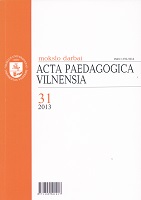Neįgaliųjų profesinis orientavimas kaip profesinės reabilitacijos paslauga
VOCATIONAL GUIDANCE FOR PEOPLE WITH DISABILITY IN VOCATIONAL REHABILITATION
Author(s): Daiva Juozapavičienė, Rūta Sargautytė, Edita ŠatienėSubject(s): Education
Published by: Vilniaus Universiteto Leidykla
Keywords: vocational rehabilitation; vocational guidance for disabled people; work motivation; vocational training motivation, belief in personal abilities to get a job; placement
Summary/Abstract: Vocational guidance and consultation constitute an important part of the vocational rehabilitation system for disabled people in Lithuania. Since 2005, the Valakupiai Rehabilitation Centre has been providing complete vocational rehabilitation services for people with various disabilities. Now, it is responsible for elaborating and introduction of a qualitative and evidence-based service methodology in Lithuania, corresponding to the status of a methodological centre. Vocational rehabilitation for disabled people consists of five parts: (1) analysis of motivation for vocational training and personality characteristics; (2) consultation in vocational mindedness, fitness ,and planning of vocational career; (3) supplying information on the possibilities of vocational training and placement; (4) probation of vocational skills; (5) helping a person to choose or change the specialty according to his/her individual characteristics (interests, abilities, disposition), specifity of a profession, and possibilities of training and placement. The aim of the research was to evaluate the effectiveness of vocational guidance service at the Valakupiai Rehabilitation Centre in relation to the later vocational training and placement. Data on 109 persons from the 2010–2011 vocational rehabilitation program, including the follow-up, have been analyzed. The results showed high rates in vocational training and placement, following vocational guidance and other vocational rehabilitation services. The most remarkable result was the relation obtained between the later vocational training and placement to motivation and belief in personal abilities to get a job, but not to the level of disability itself. Recommendations of the study stress the importance of the the motivation enhancement tools in the vocational guidance of people with disabilities.
Journal: Acta Paedagogica Vilnensia
- Issue Year: 2013
- Issue No: 31
- Page Range: 47-60
- Page Count: 14
- Language: Lithuanian

